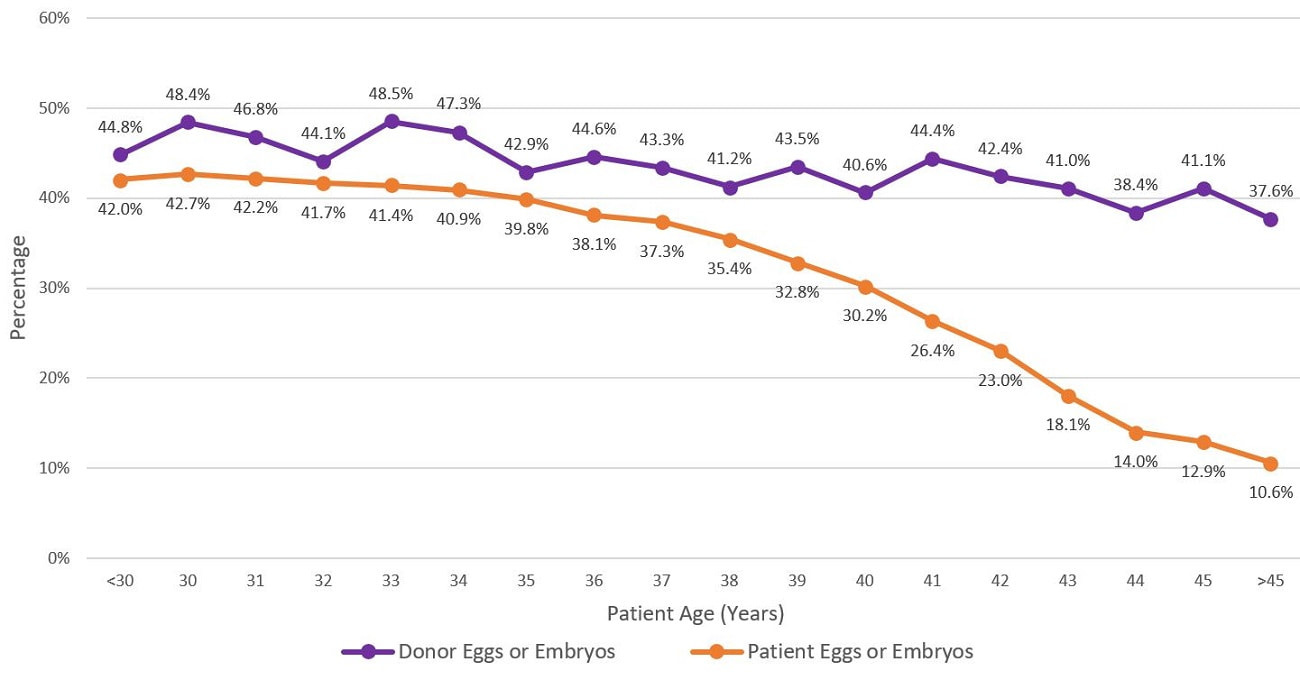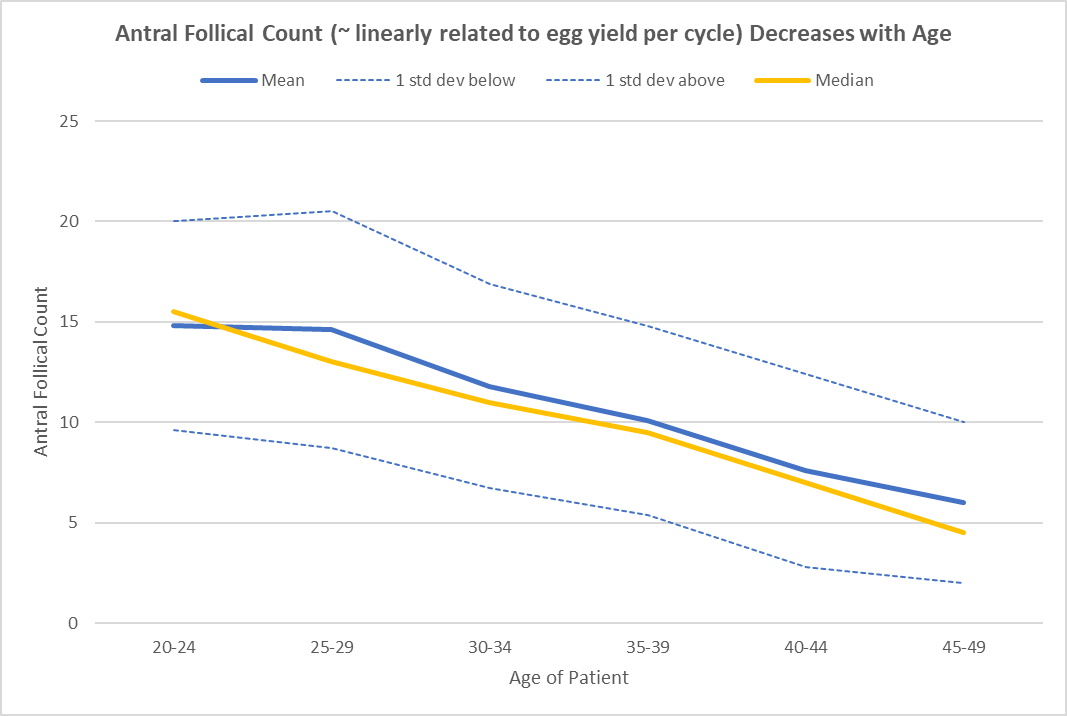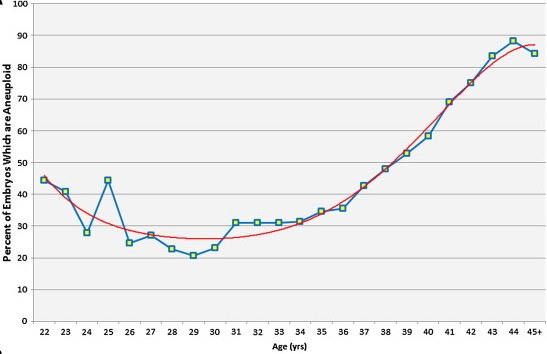For the Love of Humanity
Freeze your eggs as early as you can!
You’ve likely already heard about the so-called fertility crisis, but in case you haven’t you can read about it here, and here. This post by Simone and Malcom Collins makes what I feel is a convincing case for prioritizing halting Demographic Collapse as an EA cause area. Basically, most of the world ex Africa is below replacement fertility rates (2.1 babies per woman) and the UN estimates that we’ll be below replacement rates globally by 2050. Given that our economic systems, including programs like Medicaid, are predicated on population growth, this trend spells serious future problems if it’s not reversed.
United Nations, Department of Economic and Social Affairs, Population Division (2022). World Population Prospects 2022: Summary of Results. UN DESA/POP/2022/TR/NO. 3.
But you can read about the species level concerns somewhere else. This post is more about personal fertility decisions, especially for women who are pursuing advanced degrees or consuming careers and won’t be in a position to begin having children until they’re in their 30s.
I’ve been frankly shocked by a number of casual conversations I’ve had with friends and coworkers that indicate a lack of foresight and realism around fertility and fertility extension. Many of these conversations remind me of the back and forth between Carrie and her new beau Aleksandr in SATC season 6 episode 15, Catch-38 after he tells her he’s had a vasectomy:
ALEKSANDR
How about you? You never wanted children?
CARRIE
No, I've always thought that I might, I just, you know, I just haven't gotten around to it yet.
ALEKSANDR
And when are you planning to do this? How old are you? 38?
CARRIE (narrating)
I felt like I was just shot with a.38.
My fertility story…
I went through an egg freezing cycle this past fall just before I turned 31. I was fortunate to have all my costs covered by my workplace, but even if I hadn’t, I still think it would've been worthwhile for me. Freezing your eggs gives you option value. You can use that option to have your first child late, or to have a second or third one in your 40s, or you can let the option expire worthless (or donate those eggs to someone else). In my case, I intend to start having kids soon enough that I probably won’t use my frozen eggs for my first one. But I like the idea that I don't have to start ASAP and can have more choice in how many kids I want with less time pressure.
When I responded to the customary “Tell me what’s going on with you” on coffee dates with friends and colleagues, any mention of what was really going on - that I was in the middle of an egg retrieval cycle - was often met with awkward glances and general discomfort, as if there’s something prurient about freezing eggs. I only bring this up because I think the discomfort around talking about fertility honestly is part of the problem. But anyways, more pertinent to this post was how many people replied with some variant of “You’re so young though! Why do this now? You have so much time!” Well… actually not really.
Egg age, not womb age, is the limiting factor for women’s fertility
As Ruxandra Teslo detailed in her excellent post on what the data says about egg freezing (which also pointed me to some of the other sources used for this piece), while the age of the womb only moderately impacts IVF success rates, the rule for egg age is basically “the younger the better”.
IVF requires egg retrieval, embryo creation and finally embryo transfer. Instead of using the eggs retrieved to immediately make and use embryos for IVF you can instead elect to freeze eggs, or to make embryos and freeze those for later use. So the process involved when doing an egg freezing cycle is a part of normal IVF.
To demonstrate the impact of egg age we can look at the below plot which shows the percentage of embryo transfer cycles started in 2020 that resulted in live-birth delivery of one or more infants, by patient age and egg or embryo source. We can assume that donor eggs are generally from young women (probably <30).
From: CDC 2020 ART Report
While women can successfully carry children well into their 40s when using younger donor eggs, the success rate for transfers with patient eggs or embryos starts to drop off around 36. At first glance this might appear to suggest that waiting until you’re ~35 to freeze your eggs vs. doing it at 31 (or even younger) wouldn’t make much of a difference. But an IVF transfer being done at all implies that the patient has successfully created a healthy enough embryo for the clinic to implant, and that also gets harder with age (as I’ll detail below).
How many eggs do you get when you do a retrieval cycle?
Normally around 10. But the number of eggs retrieved per egg freezing cycle generally gets lower as a woman ages. I couldn’t find a good source for the average number of eggs retrieved per cycle vs. age, but I was able to find data on follicle count vs. age. Follicle count is more or less linearly related to the number of eggs retrieved with high correlations shown in this study as well as this one.
Data from: Bozdag, Gurkan, et al. "Age related normogram for antral follicle count in general population and comparison with previous studies." European Journal of Obstetrics & Gynecology and Reproductive Biology 206 (2016): 120-124.
While the success rate of IVF transfers doesn’t meaningfully start to drop off until the eggs are 36+, the number of follicles has already started to drop off significantly by the time a woman is in her early 30s. Up to around 25 eggs per cycle, the more eggs that you’ve retrieved the better your chance is of making a healthy embryo with those eggs, you just have more shots on goal.
But how do the eggs themselves change as you age?
In addition to getting fewer eggs per cycle as you age, each egg retrieved is also more likely to be abnormal and less likely to create a healthy embryo. Most notably, as you age each egg is more likely to be aneuploid, (i.e. to have an abnormal number of chromosomes; the most well-known example of aneuploidy is Down Syndrome).
Franasiak, Jason M., et al. "The nature of aneuploidy with increasing age of the female partner: a review of 15,169 consecutive trophectoderm biopsies evaluated with comprehensive chromosomal screening." Fertility and sterility 101.3 (2014): 656-663.
The above plot shows that the chance an egg is aneuploid has also already started to rise by your early 30s, so it’s not surprising that live birth rates vs. number of eggs (oocytes) retrieved decreases with age.
Figure 3 from: Fanton, Michael, et al. "A higher number of oocytes retrieved is associated with an increase in fertilized oocytes, blastocysts, and cumulative live birth rates." Fertility and sterility 119.5 (2023): 762-769. (Note there is a typo in the plot which I pulled from the paper - the blue line should be labeled 35-37)
So how does this cash out in terms of the effectiveness of an egg freezing cycle?
With fewer eggs per cycle and a lower percentage of healthy eggs, as you age you can expect to need more egg retrieval cycles to get the same chance of successfully using those eggs to have a baby. And while the egg freezing process wasn’t as bad as I expected it certainly wasn’t… good. I’ll spare you the details but given the expense, inconvenience and discomfort you’d certainly rather avoid extra cycles.
Let’s assume that the average number of follicles is equal to the average number of eggs retrieved per cycle (this isn’t exactly true but it’s close enough). If we combine the data on the average number of follicles by age with the above plot (I’m eyeballing this) we’d get something like the below expected live birth rate per freezing cycle by age.
Since the plot from Fanton, Michael et al doesn’t include additional granularity for the <35 group, I assumed that the <35 line applies to the 20-24 and 25-29 groups as well as the 30-34 group (I made similar assumptions for the over 40 groups). This is surely underestimating the expected live birth rate for the <30 groups.
Nevertheless, this would imply that freezing eggs when you’re 30-34 would result in about a 57% chance of a live birth per freezing cycle, which drops to about a 42% chance by 35-37 and to only 32% for ages 38-40. Expected live birth rate per cycle is below 15% by the time you’re over 40. It’s also safe to assume that your chances are better when you’re on the younger vs. older side of each age group, so expected live birth rate per cycle at 30-31 is likely above 57% and that for 32-34 is likely below 57%.
So when should you freeze your eggs?
This suggests that there’s a significant advantage to freezing eggs in your late 20s or early 30s vs. your late 30s (around a 1.6x higher chance of a live birth per cycle). Yet, this NYU Langone study of 543 patients over fifteen years had a median age of 38 at the time of egg freezing!
There is a trade off between the age that you freeze your eggs and paying the storage costs (which are around $1000/year), so I probably wouldn’t bother freezing eggs before 25, especially since aneuploidy appears to decrease during the early 20s. But this certainly implies that if you expect to do egg freezing at some point you should do it as soon as you can starting from your late 20s. So, again, I did not in fact have “so much time”, if anything I should’ve done it the previous year, as soon as I had coverage from my employer.
Conclusion
The main takeaway I’m hoping people get from this post is that we should change the narrative around egg freezing from something that you do as a last-ditch effort when you’re still single and your fertility window is about to close to something you do as a part of planning for your future as soon as it’s financially viable. While it might not be fair that women have to worry so much more about their fertility window than men do, pretending the issue doesn’t exist and telling women they have plenty of time doesn’t ameliorate that, it just sets women up for future regret.
Having frozen eggs not only allows you to start having kids after your fertility has begun to decline, but it can also allow you to choose to have a second or third baby after the window has closed (or is closing). Or it can allow you to take more time between pregnancies. Fertility seems to be (rightfully) really important to people, and I feel that the ability to increase choice in this domain is being undervalued by other women like me.
And one other point for women who aren’t sure if they even want to have kids but have insurance coverage for egg freezing or otherwise aren’t worried about the financial burden. If my 20s have taught me something, it's that I'm a work in progress. My preferences will change and evolve and so will yours. You don't want your biology to hold you hostage. So if you have the financial option and the time to do a cycle it’s something to seriously consider.
Of course not everyone has coverage from their employer and the cost is high (my cycle was about 17k including drugs), but if you can afford it, want more than one child, and don’t see yourself getting pregnant for the first time until you’re in your 30s it might be worth the investment anyways whether you have a partner or not.








This is a strong case for requiring insurance to cover egg freezing and storage, since social changes sometimes bring changes in medical needs as well. I've seen the heartbreak of friends who waited too long.
Humans often have a strong psychological bias against thinking practically about their aging and mortality, however. I wonder how we can overcome that? Maybe if insurance framed this as just a regular part of medical care. We can have people celebrate "Egg Retrieval Day" on TikTok...
Interesting argument with regard to concerns about depopulation. Are there any economic models that aren't predicated on growth of population forever? At times it can almost feel like our economy only works because it is like a Ponzi scheme. Could technology/automation relieve the need for endless human growth?
The reason I ask is while technology has allowed much more humans to be supported than would have originally been calculated based on our pre-tech carrying capacity will that hold 1000 years, 10,000 years, 5 million years into the future?
We are already it appears into a serious mass extinction some dub the anthropocene. Can population growth forever also allow room for other species (where habitat loss is one of the main drivers) or do they have to be a necessary casualty of the need to grow to keep our economic model working?